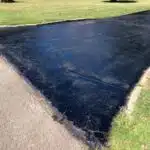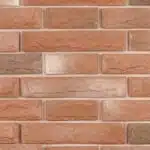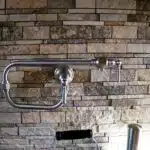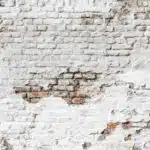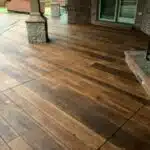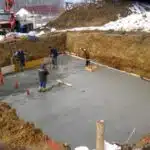Welcome to our article on the different types of driveway pavers and how to choose the right one for your home. As a driveway paving expert, I understand that choosing the right material for your driveway is an important decision that requires careful consideration. Your driveway not only provides access to your home but also adds to its overall aesthetic appeal. It is therefore essential to select a material that will not only withstand heavy traffic but also complement the style of your home.
There are several types of driveway pavers available, each with its unique characteristics and benefits. From natural stone to concrete, brick, and permeable pavers, choosing the right option can be overwhelming. In this article, we will explore each type of paver in detail and provide you with essential information to help you make an informed decision when it comes to selecting the best paver for your driveway. So let’s dive in!
Natural Stone Pavers
Natural stone pavers are a popular choice for driveway paving due to their natural beauty and durability. These pavers are made of various types of natural stones such as limestone, granite, and sandstone. They come in different sizes, shapes, colors, and textures that can add an elegant touch to any driveway.
When it comes to installation tips for natural stone pavers, it is important to prepare the base properly. The base should be compacted and leveled before laying the pavers. This will ensure a stable foundation that can withstand heavy loads and prevent the pavers from shifting or settling over time. Additionally, it is recommended to use a layer of sand between the base and the paver to help with drainage and prevent weed growth.
One advantage of natural stone pavers is the wide range of color options available. From warm earthy tones like beige and brown to cool shades like gray and blue, there is a color that can complement any home style. Moreover, some types of natural stones can even change color over time due to weathering or exposure to sunlight, adding character and uniqueness to your driveway.
Moving on from natural stone pavers, concrete pavers offer another set of benefits that homeowners may consider when choosing the perfect type of material for their driveway.
Concrete Pavers
Concrete pavers are one of the most popular options when it comes to driveway paving. They are durable, versatile, and come in a variety of color options that can complement any home’s aesthetic. However, before choosing concrete pavers for your driveway, it is important to consider the different texture variations available.
One of the benefits of concrete pavers is that they can be stamped or molded to emulate natural stone textures such as slate or flagstone. This provides homeowners with a budget-friendly option that still adds an upscale touch to their property. Additionally, concrete pavers come in various sizes and thicknesses, making them ideal for accommodating any weight requirements.
When it comes to color options, concrete pavers offer more versatility than other materials like asphalt or brick. Homeowners can choose from a wide range of colors including earthy tones like beige or brown, bold hues like red or blue, or even neutral shades like gray or black. The ability to customize the color of your driveway allows you to select a shade that complements your home’s exterior and landscaping.
Transitioning into the subsequent section about brick pavers, it is important to note that while both materials offer different benefits, each has its own unique appeal. Brick pavers provide a classic look with their uniform shape and size while also offering a rustic charm that complements older homes. In the next section, we will explore the benefits of using brick pavers as well as how to choose the right ones for your driveway.
Brick Pavers
Brick pavers are a popular type of driveway paver due to their classic and timeless aesthetic appeal. They are made from natural materials, which makes them eco-friendly and sustainable. Brick pavers come in different shapes, sizes, and colors, which gives homeowners the flexibility to choose the one that best suits their design preference. In terms of color options, there are a variety of hues available ranging from earthy tones such as brown and red to lighter shades like beige.
The installation process for brick pavers is relatively straightforward but requires professional expertise to ensure a stable foundation. The first step is to excavate the area where the driveway will be installed and level it out. A layer of sand or gravel is then added to provide a stable base for the pavers. The bricks are then laid out on top of this layer in a pattern of choice. Finally, sand is poured over the bricks, which fills in any gaps between them and locks them into place.
When choosing brick pavers for a driveway, it is important to consider their durability as they can withstand heavy traffic and extreme weather conditions. Additionally, homeowners should take into account the maintenance required for their selected color option as some may show stains or wear more easily than others.
Transitioning into the subsequent section about permeable pavers: While brick pavers offer an excellent combination of durability and design aesthetics for driveways, some homeowners may opt for a more environmentally conscious option such as permeable pavers. These types of driveway pavers allow water to seep through them rather than accumulating on top, which helps prevent runoff and erosion.
Permeable Pavers
Permeable pavers are an environmentally friendly option for driveways, as they allow rainwater to pass through the paving surface and reduce runoff. There are various types of permeable pavers available, including concrete, interlocking concrete, and plastic grid pavers. The benefits of permeable pavers include reduced flooding, improved water quality, and lower maintenance costs. When choosing a permeable paver, factors such as climate, drainage, loading, and budget should be considered. Installing permeable pavers involves laying a permeable base beneath the pavers and ensuring the pavers are properly spaced and level. Permeable pavers require regular maintenance such as sweeping, cleaning, and occasional repairs.
Benefits Of Permeable Pavers
Permeable pavers are becoming increasingly popular due to their environmental benefits. Unlike traditional pavers, permeable ones allow water to seep through and into the ground beneath them, reducing stormwater runoff and helping prevent erosion. This can be especially beneficial in areas with heavy rainfall or where water conservation is a concern.
One of the installation techniques for permeable pavers involves using an open-graded base material, which allows water to infiltrate into the soil below. This helps replenish groundwater supplies and can even help reduce flooding in some areas. Additionally, permeable pavers can be used in conjunction with rain barrels or other stormwater management systems, further reducing their impact on the environment.
Overall, choosing permeable pavers for your driveway not only benefits the environment but also provides a unique and attractive look for your home’s exterior. With proper installation techniques and maintenance, these pavers can last for years while also helping to preserve our natural resources. Consider talking to a professional driveway paving expert to learn more about how permeable pavers could benefit your home.
Types Of Permeable Pavers
Permeable pavers have been gaining popularity due to their numerous environmental benefits. These types of pavers allow water to infiltrate through the surface, avoiding stormwater runoff and controlling soil erosion. They can also help conserve water in areas with limited supply or heavy rainfall. However, homeowners who plan on installing permeable pavers should know that there are several types available in the market.
One type of permeable paver is the porous concrete, which is made by leaving out some or all of the finer aggregates during its production. It has a high level of porosity and can handle heavy use without cracking or wearing down quickly. Another type is the permeable interlocking concrete paver (PICP), which comprises small gaps between the bricks that allow water to flow through them. This type requires an open-graded base material for its installation but offers a pleasing aesthetic aspect due to its varied colors and shapes.
Lastly, there is the resin-bound gravel, wherein small stones are coated with a clear binder that forms a solid layer over time. It provides a unique appearance with its natural-looking finish and is almost maintenance-free when installed correctly. However, this type may be more expensive than other permeable pavers and requires professional installation skills.
In conclusion, understanding the different types of permeable pavers available in the market helps homeowners make informed decisions based on their preferences and needs. Each type comes with its unique features, benefits, installation challenges, and cost considerations that driveway paving experts can explain further. With proper installation techniques and routine maintenance practices, homeowners can enjoy their permeable pavers’ long-lasting beauty while contributing positively to the environment’s preservation efforts.
Installing Permeable Pavers
Permeable pavers have become a popular choice among homeowners due to their numerous benefits. They allow water to infiltrate through the surface, reducing stormwater runoff and controlling soil erosion. They can also help conserve water in areas with limited supply or heavy rainfall. However, it is essential to understand that installing permeable pavers requires careful consideration of several factors.
One of the critical decisions homeowners need to make when installing permeable pavers is whether to do it themselves or hire professionals. DIY installation may seem cost-effective, but it may not be the best option for everyone. Professional installation guarantees quality workmanship and adherence to standard procedures, ensuring that homeowners get the most out of their investment. Moreover, professional installers have access to specialized equipment and materials that are necessary for successful installation.
Another factor to consider when installing permeable pavers is the potential drawbacks that come with their use. For instance, if not installed correctly or adequately maintained, they may become clogged with debris over time, reducing their effectiveness in controlling stormwater runoff. Additionally, some types of permeable pavers may require more maintenance than others, which may add up over time. Therefore, homeowners should weigh the benefits against the potential drawbacks before making a final decision on whether to install permeable pavers on their property or not.
Durability And Longevity
A driveway is a significant investment for any homeowner. Not only does it add curb appeal, but it also adds functionality to your home. Choosing the right material for your driveway pavers can make all the difference in how long they last and how well they hold up over time. When it comes to comparing durability and longevity, there are several factors to consider.
Firstly, it’s essential to look at the strength of the materials you’re considering. Some materials like concrete or asphalt may be more durable than others like brick or natural stone. However, each material has its unique strengths and weaknesses that should be taken into account when choosing the right one for your driveway. Other factors to consider include the amount of traffic your driveway gets, climate conditions, and maintenance requirements.
Secondly, you need to think about longevity when choosing a material for your driveway pavers. A material’s lifespan is affected by several factors such as traffic load, weather patterns, and maintenance practices. For example, if you live in an area with harsh winters or heavy rainfall, you’ll want to choose a material that can withstand these environmental conditions. Additionally, if you plan on using your driveway frequently or have heavy vehicles driving on it regularly, you’ll want a material that can handle that kind of wear and tear.
When comparing durability and longevity between different types of driveway pavers, it’s crucial to keep these factors in mind. Choosing the right material for your specific needs will ensure that your investment is worth it in the long run. In the next section, we’ll discuss maintenance requirements needed for each type of paver so that you can make an informed decision when planning your home renovation project.
Maintenance Requirements
As we have discussed in the previous section, the durability and longevity of driveway pavers are crucial factors to consider before making a decision. However, it is also essential to be aware of the maintenance requirements that come with each type of paver.
Cost comparison is one aspect that homeowners should keep in mind when it comes to maintaining their driveways. Some types of pavers may require more frequent upkeep than others, resulting in higher expenses over time. It is important to factor in the long-term costs while making a choice regarding driveway pavers.
To ensure longevity and reduce maintenance costs, DIY maintenance tips can come in handy. Simple steps like regular sweeping and washing can prevent the buildup of dirt and grime on the surface. Additionally, applying sealant every few years can protect against stains and weather damage.
Moving forward, let us delve into another important aspect of driveway pavers – aesthetic appeal and design options. Different styles and colors can enhance the overall look of your home’s exterior while adding value to your property. Let us explore some popular choices for homeowners looking to beautify their driveways.
Aesthetic Appeal And Design Options
As a driveway paving expert, it amazes me how often people overlook the importance of aesthetic appeal when selecting their pavers. A driveway is more than just a practical necessity; it’s also an opportunity to showcase your personal style and add curb appeal to your home. That’s why design inspiration and color selection should be at the forefront of your mind when choosing the right paver for your driveway.
When it comes to design inspiration, there are endless possibilities to choose from. You can opt for a classic look with traditional brick or cobblestone patterns, or go for a modern twist with sleek, geometric designs. Additionally, consider incorporating different textures into your design. Some pavers have a smooth finish while others have a rougher texture that can add depth and interest to your driveway.
Color selection is another important aspect of choosing the right paver for your driveway. Do you want to match the color scheme of your home or create contrast? Do you want a bold statement or something more subdued? The options are endless, but it’s important to keep in mind that certain colors may fade over time due to exposure to sunlight or harsh weather conditions. Choose colors that will stand the test of time and complement the overall aesthetic of your property.
Now that we’ve explored the importance of aesthetic appeal and design options when selecting driveway pavers, let’s move on to climate considerations. It’s important to choose pavers that can withstand extreme weather conditions such as heavy rain, snowfall, and high temperatures. We’ll explore this topic in greater detail in the next section.
Climate Considerations
Climate Considerations:
When it comes to choosing driveway pavers, weather resistance is an important factor to consider. Different materials have varying levels of resistance to weather elements like rain, snow, and heat. For instance, concrete pavers are known for their high resistance to extreme temperatures and heavy rainfall. On the other hand, brick pavers may not be as weather-resistant and may require regular maintenance in areas with frequent harsh weather conditions.
Durability testing is another crucial aspect to evaluate when choosing driveway pavers. The test involves subjecting the pavers to different pressures and conditions to assess their strength and resistance. The results can help determine the ideal material for your driveway depending on factors such as traffic volume and weight load.
To ensure that your driveway pavers withstand different climate conditions, here are some key considerations:
- Choose materials that are resistant to moisture damage
- Opt for thick pavers that can withstand heavy traffic
- Select colors that will not fade easily under direct sunlight
- Consider non-slip options if you live in areas prone to ice or snow
- Make sure the drainage system is efficient enough to prevent pooling water
Making these considerations will go a long way in ensuring that your driveway remains functional, safe and aesthetically pleasing over time. In the next section, we will look at how cost and budget play a critical role in selecting driveway pavers.
Cost And Budget
The cost of driveway pavers varies depending on the type, size, and design. It is important to consider your budget allocation before choosing a specific material as it can significantly impact the overall cost. However, keep in mind that higher-priced pavers may have a longer lifespan and require less maintenance than cheaper options.
When planning your budget, consider both the upfront costs and potential long-term savings. For example, while concrete may be a more expensive option initially, it may save you money in the long run by requiring less maintenance and repairs than other materials. Additionally, some materials may have additional installation costs such as edging or base preparation which should also be factored into your budget.
Ultimately, it is important to choose a driveway paver that fits within your budget while also meeting your aesthetic preferences and functional needs. Consider consulting with a professional to determine which options are best suited for your specific situation. In the next section, we will discuss the installation process of driveway pavers and what to expect during this stage of the project.
Installation Process
- The planning stage is an important step when installing driveway pavers. Considerations need to be made for the material, size, and shape of the pavers to be used.
- The necessary tools for a driveway paving project depend on the materials and style of pavers selected. A shovel, wheelbarrow, level, and trowel are essential items.
- To begin laying the pavers, start with a layer of crushed gravel and tamp it down to provide a stable base.
- Once the crushed gravel is laid, a layer of sand should be added and then tamped down until it is level.
- Pavers should be laid in a pattern, starting at one corner and working toward the other.
- To ensure the pavers are secure and level, a rubber mallet should be used to tap them into place.
Planning
Designing and installing a new driveway is an exciting prospect for any homeowner. It can transform the exterior of your home, adding character and value to your property. However, before beginning the installation process, there are several planning considerations that need to be made. These design considerations involve selecting the right type of paver for your driveway, ensuring it complements your home’s style and color scheme.
Material selection also plays an essential role in creating the perfect driveway. As a driveway paving expert, I recommend considering factors such as durability, maintenance requirements, and climate when choosing pavers. For instance, concrete pavers are durable and require minimal maintenance, making them ideal for high traffic areas. On the other hand, natural stone pavers offer a sophisticated look but may require sealing to protect against harsh weather conditions.
In conclusion, designing and installing a new driveway requires careful planning to ensure you choose the right paver that meets all your needs. Factors such as design considerations and material selection play an integral part in creating a beautiful driveway that complements your home’s aesthetic appeal while lasting for years to come. Therefore, it’s essential to seek advice from experienced professionals who can guide you through the entire installation process from start to finish.
Tools
Now that we have discussed material selection and design considerations, let’s focus on the installation process. Installing a new driveway requires several tools, and as a driveway paving expert, I recommend using power tools to make the process more efficient. Power tool options such as masonry saws and plate compactors are ideal for preparing the ground for your pavers. These tools help you achieve uniformity in the base, ensuring that your driveway is level and stable.
While power tools can make the installation process easier, it’s essential to prioritize safety when working with them. As a responsible homeowner, you should invest in safety equipment such as gloves, eye protection gear, and earplugs to protect yourself from potential hazards. Additionally, it would be best if you read the user manual of each tool before use to understand how it works and how to operate it safely.
In conclusion, installing a new driveway requires various power tools and safety equipment to ensure efficiency and safety during construction. By investing in these resources, you can create a beautiful driveway that adds value to your property while ensuring that all involved parties remain safe throughout the installation process. Remember always to follow proper guidelines when using power tools to prevent accidents or damage to your home or surroundings.
Laying Pavers
Now that we’ve discussed the importance of material selection, design considerations, and power tools for driveway installation, let’s move on to the next crucial step: laying pavers. Using pavers to create a driveway offers several benefits compared to other materials. Pavers are durable, versatile, and come in various sizes and shapes, allowing you to customize your driveway to your liking. They also require less maintenance than other materials and can withstand harsh weather conditions.
If you plan on laying pavers yourself, there are a few essential DIY tips you should keep in mind. First, make sure the ground is properly prepared by removing any debris and creating a level base. Doing this ensures that your pavers lay evenly and are stable enough to support vehicles. Additionally, when laying the pavers, it’s essential to use spacers between each piece to maintain consistent spacing and achieve a professional-looking finish.
Another important tip is to use sand as filler between the pavers instead of mortar or cement. Sand allows for better drainage and prevents water from getting trapped between the pieces, which could cause damage over time. It’s also easier to replace individual pavers if needed when using sand as filler. Overall, using these DIY tips will help ensure that your paver driveway looks great while remaining sturdy enough for everyday use.
Environmental Impact
After understanding the installation process of driveway pavers, it is important to consider the environmental impact of your choice. As sustainability concerns continue to grow, there are eco-friendly options available for those who want to reduce their carbon footprint. These options not only benefit the environment but also provide long-term cost savings.
The first option for eco-friendly driveway pavers is permeable pavers. These pavers allow water to seep through and replenish groundwater rather than runoff into storm drains. This reduces the amount of pollution that enters local waterways and helps prevent flooding. Additionally, permeable pavers can be made from recycled materials such as glass or plastic, which further reduces their environmental impact.
Another eco-friendly option is using reclaimed or salvaged materials for your driveway pavers. This involves repurposing materials that would otherwise end up in a landfill, such as old bricks or stone slabs. Not only does this reduce waste, but it also adds a unique character to your driveway. The use of reclaimed materials can also increase property value and provide a conversation starter for visitors.
When choosing your driveway paver material, it’s important to consider its compatibility with vehicles. While eco-friendly options may have additional benefits, they must also be able to withstand heavy loads from cars and trucks without cracking or breaking down quickly. In the next section, we will explore the different types of driveway pavers in relation to their compatibility with vehicles.
Compatibility With Vehicles
Compatibility with Vehicles:
When choosing driveway pavers, it is important to consider their compatibility with vehicles. This includes factors such as weight capacity, traction, and slope angle. Failing to take these factors into account can result in a driveway that is unsafe for both people and vehicles.
Weight capacity refers to the maximum amount of weight that the pavers can support without becoming damaged or sinking. This is particularly important for driveways that will be used by heavy vehicles such as trucks or SUVs. It is essential to choose pavers that have a high weight capacity in order to prevent damage and ensure the longevity of the driveway.
Traction and slope angle also play an important role in driveway safety and maintenance. The slope angle should be carefully planned to prevent water from pooling on the surface, which can cause damage over time. Additionally, pavers with good traction are essential for preventing accidents, particularly during wet or icy conditions.
| Factor | Importance | Considerations |
|---|---|---|
| Weight Capacity | High | Heavy vehicles require strong support |
| Traction | High | Prevents accidents during wet or icy conditions |
| Slope Angle | Medium | Prevents water damage and pooling |
In summary, choosing driveway pavers that are compatible with vehicles is crucial for ensuring safety and minimizing maintenance costs. Factors such as weight capacity, traction, and slope angle should all be considered when making a selection. By taking these considerations into account, homeowners can ensure that their driveway will provide reliable service for years to come.
Moving forward from considering the compatibility of your chosen paver material with your vehicle(s), it’s imperative to know if your choice passes local building codes and regulations not limited to drainage systems or pedestrian access points.
Local Building Codes And Regulations
When considering installing a new driveway, it’s important to keep in mind that there are local building codes and regulations that must be followed. These rules are in place to ensure the safety of everyone involved and to prevent any damage to surrounding properties. Ignoring these regulations can result in costly fines or even legal action.
One crucial aspect to consider is obtaining a building permit. This is typically required for any construction project, including driveway installation. The process for obtaining a permit varies depending on your location, but it usually involves submitting plans and paying a fee. It’s important to research the specific requirements in your area before beginning any work.
In addition to building permits, zoning restrictions must also be considered. These regulations dictate where structures can be built and what they can be used for. Neighborhood covenants and HOA regulations may also come into play, as some communities have strict guidelines on materials and design choices for driveways. Before making any decisions, it’s important to review these guidelines carefully to avoid any potential conflicts with neighbors or community associations.
4-item numeric list:
- Research local building codes and regulations before beginning any work.
- Obtain a building permit before starting construction.
- Consider zoning restrictions when choosing the location for your new driveway.
- Review neighborhood covenants and HOA regulations regarding materials and design choices.
Moving forward, selecting the right contractor is another vital step in ensuring that your driveway project goes smoothly. By thoroughly researching potential contractors and obtaining multiple quotes, you can make an informed decision about who will best meet your needs while adhering to all necessary regulations.
Contractor Selection
The selection of a driveway contractor should be based on their qualifications and experience. To determine the qualifications of a contractor, it is important to look at their licenses and certifications. Furthermore, it is important to consider the contractor’s level of experience in driveway paving. Reviews of the contractor’s past work should also be taken into account when making a decision. Additionally, it is important to research any customer complaints against the contractor. Finally, it is beneficial to have a clear understanding of the contractor’s estimates and timelines for completing the project.
Qualifications
When it comes to selecting a contractor for your driveway paving project, there are several qualifications you should consider. One of the primary advantages of hiring a professional contractor is that they have the necessary skills and experience to complete the job correctly. They will also have access to specialized equipment and materials that may not be available to homeowners attempting a DIY project. However, it’s important to note that not all contractors are created equal.
One disadvantage of hiring a contractor is that they can be expensive. Before making any decisions, it’s essential to obtain quotes from several different companies to ensure you’re getting a fair price for their services. You’ll also want to check their references and look at examples of their past work to ensure they have successfully completed similar projects in the past.
Another qualification to consider when selecting a contractor is their level of communication and customer service skills. A good contractor will take the time to listen carefully to your ideas and concerns and provide regular updates throughout the project. They should also be able to answer any questions you have in a timely manner and address any issues that arise quickly and professionally.
In conclusion, selecting the right driveway paving contractor requires careful consideration of several qualifications including experience, cost, references, communication skills, and customer service. By taking the time to research potential contractors thoroughly, you can feel confident in your choice and enjoy your new driveway for years to come.
Experience
When it comes to selecting a contractor for driveway paving, experience is one of the most important qualifications to consider. A contractor with years of experience will have encountered a variety of different projects and scenarios, giving them the knowledge and skills necessary to handle any challenges that may arise during your project. While personal preferences may vary, it’s generally recommended to choose a contractor with at least five years of experience in driveway paving.
One advantage of hiring an experienced contractor is that they can provide a more professional installation. They will be familiar with the latest techniques and materials, allowing them to create a driveway that not only looks great but is also durable and long-lasting. An experienced contractor will also be able to provide advice on issues such as drainage, grading, and other factors that can affect the longevity of your new driveway.
When selecting a contractor based on experience, it’s important to look for examples of their past work. A reputable contractor should be able to provide references or photos of previous projects similar to yours. By carefully evaluating their past work and ensuring they have the necessary experience for your project, you can feel confident in your choice and enjoy a beautiful new driveway for years to come.
Reviews
Another important factor to consider when selecting a contractor for your driveway paving project is customer reviews. The internet has made it easier than ever to research potential contractors and evaluate their reputation among past clients. By reading reviews, you can get a sense of the quality of work the contractor provides, as well as their ability to work within budget constraints and meet deadlines.
When evaluating reviews, it’s important to look for patterns in the feedback. A few negative reviews may not necessarily be cause for concern, but if multiple customers mention similar issues or complaints, it’s worth taking note. Additionally, pay attention to how the contractor responds to negative feedback. A reputable contractor will be willing to address concerns and work with customers to find solutions.
While reviews can provide valuable insights into a contractor’s performance, they should not be the only factor considered when making a decision. It’s important to also evaluate the contractor’s experience, qualifications, and pricing before making a final selection. However, by incorporating customer experiences into your decision-making process, you can feel confident in your choice and enjoy a successful project outcome.
Final Decision And Next Steps
Having selected a contractor for your driveway paving project, it is now time to make a final decision on the type of pavers to use. One key factor to consider is budget planning. Some types of pavers may be more expensive than others, so it’s important to know what you can afford before making a final decision. Remember that choosing cheaper options may not always be the best idea as they may not last as long or look as good in the long run.
Another consideration when choosing driveway pavers is whether or not you want to take the DIY route. DIY options can be great if you have experience in this area and are comfortable with the process. However, if you’re new to this kind of work or have limited experience, it may be best to leave it to the professionals. They have access to specialized equipment and techniques that ensure high-quality results that will stand up well over time.
When all is said and done, selecting the right driveway pavers comes down to personal preference and what works best for your specific situation. Whether you opt for traditional concrete or go for something more unique like cobblestone or brick, remember that quality installation is key. By working with an experienced professional who has access to top-of-the-line materials and tools, you can rest assured that your driveway will look great and last for years to come without breaking the bank.
Conclusion
Driveway pavers are an excellent way to enhance the curb appeal of your home while also providing a sturdy and long-lasting surface for your vehicles. Natural stone pavers, concrete pavers, brick pavers, and permeable pavers are the four most popular types of driveway paving materials available today. Choosing the right one can be overwhelming, but it’s essential to consider factors such as durability, compatibility with vehicles, local building codes and regulations, and contractor selection before making a final decision.
When it comes to durability and longevity, natural stone pavers are a top choice. They’re resistant to weathering and can withstand heavy traffic without losing their color or texture. Concrete pavers also offer excellent durability and require minimal maintenance. Brick pavers provide a classic look that’s perfect for traditional homes, while permeable pavers allow water to seep through them, preventing erosion and flooding.
It’s crucial to select a material that complies with local building codes and regulations. Consult with a professional contractor who understands these requirements before beginning any driveway paving project. Finally, choose a reputable contractor who has experience working with your chosen material and can provide references from satisfied customers.
In conclusion, choosing the right type of driveway paving material is essential for both functionality and aesthetics. By considering factors such as durability, vehicle compatibility, building codes and regulations, and contractor selection, you’ll be able to make an informed decision that meets your needs and budget. As the saying goes: “You get what you pay for,” so invest in quality materials and workmanship for a long-lasting driveway that enhances your home’s value.
Image Credits
- “Mike sticks out tongue as he works to repurpose driveway pavers for letterbox base” by Miss Shari (featured)



